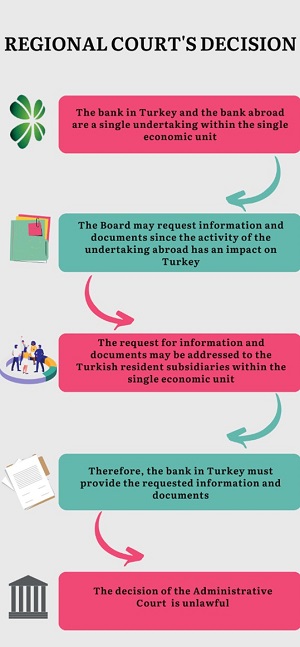In October 2022, the Regional Administrative Court's 8th Administrative Chamber ("Regional Administrative Court") revoked the Ankara 3rd Administrative Court ("Administrative Court") decision. It issued an unprecedented decision1 creating a conflict between the Law of Notification and Competition Law.
The process has begun with the Turkish Competition Authority's ("TCA") preliminary investigation into whether banks and financial institutions, including Türkiye Garanti Bankası ("the bank in Turkey") and their representative offices, have violated The Turkish Competition Act in their activities related to deposits, loans, foreign currency, bonds, bills, equities and brokerage services. Within the scope of this preliminary investigation, the TCA requested certain information and documents from the relevant undertakings. In this context, the TCA requested that correspondence made by the top 10 investors with the highest TL quoted trading volume among the investors who are employed in the US and the UK and who trade in TL, through different chat rooms, in the past two years are to be obtained from relevant platforms and submitted in electronic format.
In response to the request for information, the bank in Turkey did not provide the requested information by stating the following:
- Traders within the main shareholder BBVA2 ("the parent bank abroad") are not on the payroll of the bank in Turkey,
- Traders are subject to the laws of the country where their employer is located,
- The bank in Turkey does not have direct access to the information requested about the bank abroad,
- The information request must be notified to the parent company abroad.
The TCA decided to impose an administrative fine on banks that did not/cannot respond to the request for information
The TCA decided to impose an administrative fine of one-thousandth of the gross income on five banks that did not respond to the request for information on the grounds that they failed to comply with the obligation to provide the information requested3.
In its reasoning, the TCA evaluated whether a notification addressed to the parent company, which is established abroad, would be effective if it is sent to the subsidiary of the parent company in Turkey. In analyzing this phenomenon, the TCA gave examples from its jurisprudence, the precedent European Union practice, as well as practices of other countries. For example, in its Syndicated Loans Decision, the TCA stated that the single economic unit approach should be adopted without consideration to where the companies were established, and that the TCA is authorized to notify the Turkish subsidiary for matters addressed to the parent company abroad. Moreover, the TCA emphasizes the decisions of the European Commission, where the Commission decided that the official letter can be notified to any subsidiary of the parent company in the European Union, considering the parent company within the single economic unit and therefore has a correspondence address in the EU4.
The Bank in Turkey filed for the annulment of the TCA Decision
The bank in Turkey filed a lawsuit before the Administrative Court to challenge the TCA decision, and the Administrative Court annulled TCA's said decision. In its reasoning, the Administrative Court cited the provision of the Competition Act5 , which states that any notification to relevant parties shall be made in accordance with the Notification Act. Moreover, as per the Notification Act, the procedure to officially notify a company abroad requires a notification to the Turkish Embassy or Consulate in that foreign country through the Ministry of Foreign Affairs6. The Administrative Court, therefore, decided that the notification should be made to the legal entity abroad in accordance with the relevant provisions of the Notification Act.
The Regional Administrative Court Revoked the Annulment Decision
The TCA has subsequently filed a lawsuit before the Regional Administrative Court
for the revocation of the Administrative Court's decision. The
Regional Court has since accepted the appeal made by the TCA and
revoked the decision of the Administrative Court. In its reasoning,
the Regional Court echoed concepts of the single economic
unit and the Effects Doctrine.
Regional Administrative Court
for the revocation of the Administrative Court's decision. The
Regional Court has since accepted the appeal made by the TCA and
revoked the decision of the Administrative Court. In its reasoning,
the Regional Court echoed concepts of the single economic
unit and the Effects Doctrine.
The Regional Court emphasized that the concept of "undertaking" in competition law is defined as per the principle of the single economic unit; a subsidiary shall not be considered a standalone entity, but with the other companies it is affiliated to.
The Regional Court also stated that the economic unit in Turkey is not independent in its decisions regarding competition law. However, it is characterized as an independent company in terms of branches of the law. In other words, the Regional Court evaluated the economic unit as a single economic unit with the persons or companies that exercise control over its decisions.
In addition, referring to the Effects Doctrine, the Regional Court indicated that in assessing the competence of competition authorities, the criterion should be "whether the investigated activity of the undertaking has an impact in Turkey", rather than where the company is established.
Finally, the Regional Administrative Court stated that the undertakings, including the bank in Turkey, are obliged to provide the information requested by the TCA to the best of their abilities.
Why is This an Important Decision?
Adopting the single economic unit concept to procedural matters creates a significant contradiction with the Notification Law, which regulates the notification procedure and Competition Act, which refers to the former. As a matter of fact, this interpretation renders the procedures stipulated by the Notification Act inapplicable in the TCA proceedings.
It is important to note that the Regional Administrative Court's decision is not final; it can be appealed before the Council of State. Therefore, if the bank in Turkey appeals to this decision, the Council of State will have a say on how this dilemma is to be resolved. Should the Council of State uphold the decision of the Regional Administrative Court, the TCA can duly notify a company resident in Turkey for a request addressed to the parent company abroad on the grounds that they are considered a single economic unit in terms of competition law. In other words, the TCA will no longer follow notification procedures foreseen by the Notification Act. Accordingly, the company in Turkey will be obliged to acquire this information from the relevant company abroad and submit it to the records of TCA, even if it may not have direct access to such information.
The importance of this is that companies in Turkey that do not know the answers to the questions asked by the TCA and cannot obtain the requested information from companies abroad will frequently face administrative fines in the amount of one-thousandth of their turnover. If the Council of State upholds the decision, our understanding is that the undertakings will have to prove that they showed some effort to acquire this information, although they failed to do so. Yet it is unknown how much effort is enough to save these companies from an administrative fine.
Footnotes
1 You my access the relevant decision in Turkish here: https://www.rekabet.gov.tr/Safahat?safahatId=25f19776-efa7-4c0d-ba32-44f95fdf3c35
2 Banco Bilbao Vizcaya Argentaria S.A. (BBVA) owns 49.85% of Türkiye Garanti Bankası; the remaining 50.15% of Türkiye Garanti Bankası is publicly traded.
3 The decision of the TCA dated 02.07.2020 and numbered 20-32/397-179.
4 The decision of the TCA dated 02.07.2020 and numbered 20-32/397-179.
5 Article 61 of the Competition Act.
6 Article 25 of the Notification Act.
The content of this article is intended to provide a general guide to the subject matter. Specialist advice should be sought about your specific circumstances.

